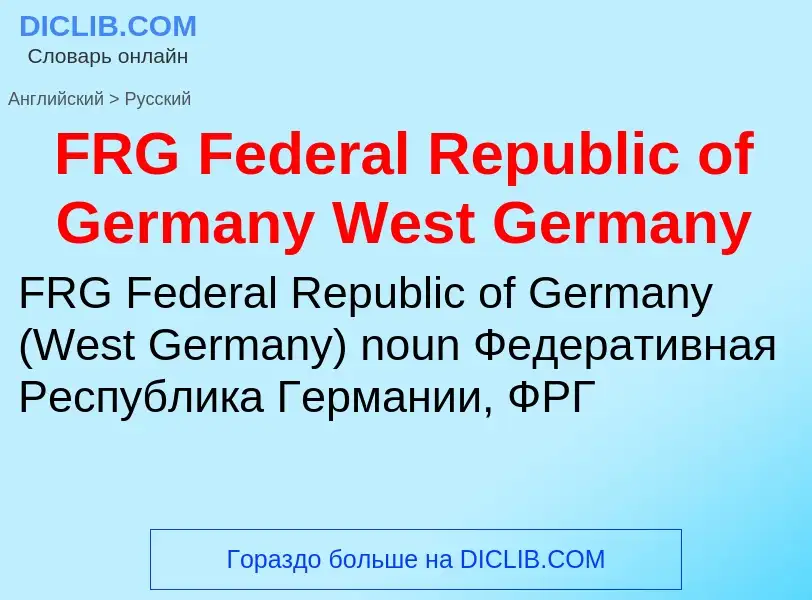Μετάφραση και ανάλυση λέξεων από τεχνητή νοημοσύνη
Σε αυτήν τη σελίδα μπορείτε να λάβετε μια λεπτομερή ανάλυση μιας λέξης ή μιας φράσης, η οποία δημιουργήθηκε χρησιμοποιώντας το ChatGPT, την καλύτερη τεχνολογία τεχνητής νοημοσύνης μέχρι σήμερα:
- πώς χρησιμοποιείται η λέξη
- συχνότητα χρήσης
- χρησιμοποιείται πιο συχνά στον προφορικό ή γραπτό λόγο
- επιλογές μετάφρασης λέξεων
- παραδείγματα χρήσης (πολλές φράσεις με μετάφραση)
- ετυμολογία
FRG Federal Republic of Germany West Germany - translation to Αγγλικά
Ορισμός
Βικιπαίδεια
West Germany (Westdeutschland) is the colloquial English term used to indicate the Federal Republic of Germany (FRG; German: Bundesrepublik Deutschland [ˈbʊndəsʁepuˌbliːk ˈdɔʏtʃlant] (listen), BRD) between its formation on 23 May 1949 and the German reunification through the accession of East Germany on 3 October 1990. During the Cold War, the western portion of Germany and the associated territory of West Berlin were parts of the Western Bloc. West Germany was formed as a political entity during the Allied occupation of Germany after World War II, established from 12 states formed in the three Allied zones of occupation held by the United States, the United Kingdom, and France. The FRG's provisional capital was the city of Bonn, and the Cold War era country is retrospectively designated as the Bonn Republic (Bonner Republik).
At the onset of the Cold War, Europe was divided between the Western and Eastern blocs. Germany was divided into the two countries. Initially, West Germany claimed an exclusive mandate for all of Germany, representing itself as the sole democratically reorganised continuation of the 1871–1945 German Reich.
Three southwestern states of West Germany merged to form Baden-Württemberg in 1952, and the Saarland joined West Germany as a state in 1957 after it had been separated as the Saar Protectorate from Allied-occupied Germany by France (the separation had been not fully legal as it had been opposed by the Soviet Union). In addition to the resulting ten states, West Berlin was considered an unofficial de facto eleventh state. While de jure not part of West Germany, as Berlin was under the control of the Allied Control Council (ACC), West Berlin politically aligned itself with West Germany and was directly or indirectly represented in its federal institutions.
The foundation for the influential position held by Germany today was laid during the economic miracle of the 1950s (Wirtschaftswunder), when West Germany rose from the enormous destruction wrought by World War II to become the world's second-largest economy. The first chancellor Konrad Adenauer, who remained in office until 1963, worked for a full alignment with the NATO rather than neutrality, and secured membership in the military alliance. Adenauer was also a proponent of agreements that developed into the present-day European Union. When the G6 was established in 1975, there was no serious debate as to whether West Germany would become a member.
Following the collapse of the Eastern Bloc, symbolised by the opening of the Berlin Wall, both states took action to achieve German reunification. East Germany voted to dissolve and accede to the Federal Republic of Germany in 1990. The five post-war states (Länder) were reconstituted, along with the reunited Berlin, which ended its special status and formed an additional Land. They formally joined the federal republic on 3 October 1990, raising the total number of states from ten to sixteen, and ending the division of Germany. The reunited Germany is the direct continuation of the state previously informally called West Germany and not a new state, as the process was essentially a voluntary act of accession: the Federal Republic of Germany was enlarged to include the additional six states of the German Democratic Republic. The expanded Federal Republic retained West Germany's political culture and continued its existing memberships in international organisations, as well as its Western foreign policy alignment and affiliation to Western alliances such as the United Nations, NATO, OECD, and the European Economic Community.

![A school in [[Lüneburg]] with an extension built in the 1970s A school in [[Lüneburg]] with an extension built in the 1970s](https://commons.wikimedia.org/wiki/Special:FilePath/2010-06-05-lueneburg-by-RalfR-02.jpg?width=200)
![[[Willy Brandt]] and [[Willi Stoph]] in [[Erfurt]], 1970; the first time a Chancellor met a GDR prime minister [[Willy Brandt]] and [[Willi Stoph]] in [[Erfurt]], 1970; the first time a Chancellor met a GDR prime minister](https://commons.wikimedia.org/wiki/Special:FilePath/Bundesarchiv B 145 Bild-F031406-0017, Erfurt, Treffen Willy Brandt mit Willi Stoph.jpg?width=200)
![The Brandt cabinet of 1969 on the steps of President Heinemanns's residence in Bonn, the [[Villa Hammerschmidt]] The Brandt cabinet of 1969 on the steps of President Heinemanns's residence in Bonn, the [[Villa Hammerschmidt]]](https://commons.wikimedia.org/wiki/Special:FilePath/Bundesarchiv B 145 Bild-F038505-0006, Bonn, Amtsantritt Kabinett Brandt bei Heinemann.jpg?width=200)
![The [[Volkswagen Beetle]]{{spaced ndash}}for many years the most successful car in the world{{spaced ndash}}on the assembly line in Wolfsburg factory, 1973 The [[Volkswagen Beetle]]{{spaced ndash}}for many years the most successful car in the world{{spaced ndash}}on the assembly line in Wolfsburg factory, 1973](https://commons.wikimedia.org/wiki/Special:FilePath/Bundesarchiv B 145 Bild-F038788-0006, Wolfsburg, VW Autowerk, Käfer.jpg?width=200)
![[[Helmut Kohl]] in 1987 [[Helmut Kohl]] in 1987](https://commons.wikimedia.org/wiki/Special:FilePath/Bundesarchiv B 145 Bild-F074398-0021 Kohl (cropped).jpg?width=200)
![chancellor of the Federal Republic of Germany]]. chancellor of the Federal Republic of Germany]].](https://commons.wikimedia.org/wiki/Special:FilePath/Bundesarchiv B 145 Bild-F078072-0004, Konrad Adenauer.jpg?width=200)


![Protest in Bonn against the deployment of [[Pershing II]] missiles in West Germany, 1981 Protest in Bonn against the deployment of [[Pershing II]] missiles in West Germany, 1981](https://commons.wikimedia.org/wiki/Special:FilePath/Massale vredesdemonstratie in Bonn tegen de modernisering van kernwapens in West, Bestanddeelnr 253-8611.jpg?width=200)
![[[Rudi Dutschke]], student leader [[Rudi Dutschke]], student leader](https://commons.wikimedia.org/wiki/Special:FilePath/Rudi.jpg?width=200)
![1974 World Cup]] held in West Germany 1974 World Cup]] held in West Germany](https://commons.wikimedia.org/wiki/Special:FilePath/Stamp football WC 1974 deutsche bundespost.jpg?width=200)
. Legeroefeningen 32e regiment. Centuriontanks en infa, Bestanddeelnr 050-0522.jpg?width=200)
